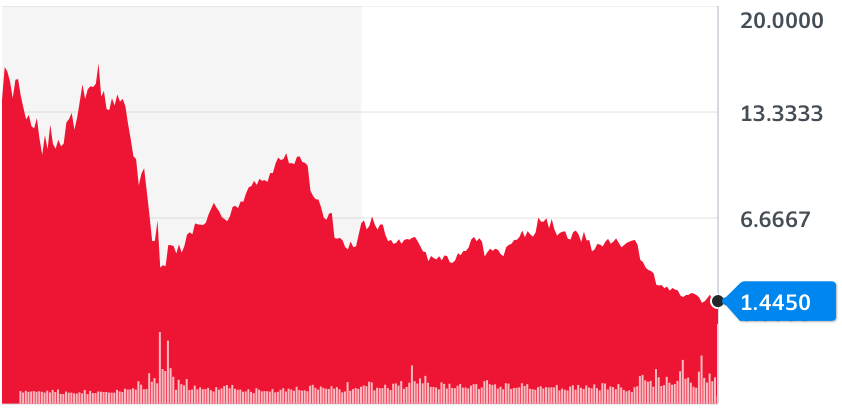

The once highly respected AMP has had a pile of trouble that has never been dealt with properly that came to a head yesterday when one of the country’s most respected bankers, David Murray, decided to resign as chairman, after being recruited to rescue the once great insurer and wealth manager.
This came from the AFR in 1997 before AMP went public and was written by two colleagues of mine — Adele Ferguson and Ross Greenwood. “AMP has confirmed that since 1991 it has been involved in legal action with 64 of its agents, and there is outstanding legal action against 29. If any of these cases creates a precedent of damages against AMP, it could cause a big headache in the lead-up to the public float.”
The float was ‘weird’, with the share price spiking over $30 for a very short time but eventually settling around $16. And it has been going downhill ever since.
AMP 1998-2020

The recent promotion of Boe Pahari to CEO of AMP Capital was the straw that broke the camel’s back for AMP.
It’s the loudest example of the new world that the old and formerly very successful AMP has failed to negotiate.
AMP’s troubles go back a long way, as my chart above shows. And yes, the share price tells the story but it was the Hayne Royal Commission that really sunk the AMP boat, with its questionable financial planning practices, resulting in a new board headed up by David Murray.
However, David and his board failed to deal with the sexual harassment incident in a modern and acceptable way for the big industry super funds (which hold AMP stocks) and some heavily-invested fund managers. They demanded change.
Murray and former Treasury Secretary and investment banker John Fraser resigned from the board and the once promoted CEO, Boe Pahari, was demoted to his old role as head of infrastructure equity.
AMP’s was a $5.30 stock before the Royal Commission. Today it’s at $1.44. That’s about an 80% fall from grace. It rose 1% yesterday.
The company has a well-known brand name but its reputation hasn’t been rescued. And that’s the job of the surviving CEO, Francesco De Ferrari, who is well-regarded but gee, he has a job on his hands.
AMP was a flagship business in Australia’s financial planning space, along the planning arms of the big banks and the likes of IOOF.
The banks have either got out of financial planning or are intending to reduce their involvement in the space. The Royal Commission has changed the profitability equation and added a whole lot more brand and profit risk to running financial planning businesses. And this could explain why the banks are vacating the industry.
For too long, too many governments in Canberra ignored the wrongs of the industry. But in 2012, led by the well-named Bernie Ripoll, Labor introduced reforms under the code name FOFA, which stood for the Future of Financial Advice.
FOFA brought some good changes, such as:
These were good steps. But the Hayne Royal Commission showed that bad practices continued.
I’ve watched these changes with interest as I started my financial planning business based on not receiving commissions and charging flat dollar fees.
These decisions were to ensure that our clients got an honest service and to protect our brand. But doing it the upfront way has not helped profitability. That said, it is the future. And a big organisation like AMP somehow has to reinvent itself and come to market with a new model.
Its brand is famous in this country but lately has become more infamous. And that’s what the new board under new chair Debra Hazelton has to address.
When the Federal Government wanted to reform the financial system and make sure our banks were safe to withstand another GFC-style event, like the current Coronavirus crash/recession, it turned to David Murray.
The Murray Inquiry and the changes that followed explain why our banks have been strong enough to help in the rescue programme mounted by the governments of Australia.
However, reforming and re-inventing AMP has been a challenge that one of our greatest bankers could not achieve. It suggests that the new board with the existing CEO, who was only appointed in December 2018, will have to come up with a new game plan for the business that suits the new age, where old financial practices will be pilloried and share prices will be trashed. If AMP doesn’t redefine what financial planning is in this country, it will continue to fail and its share price will remain in the cellar.